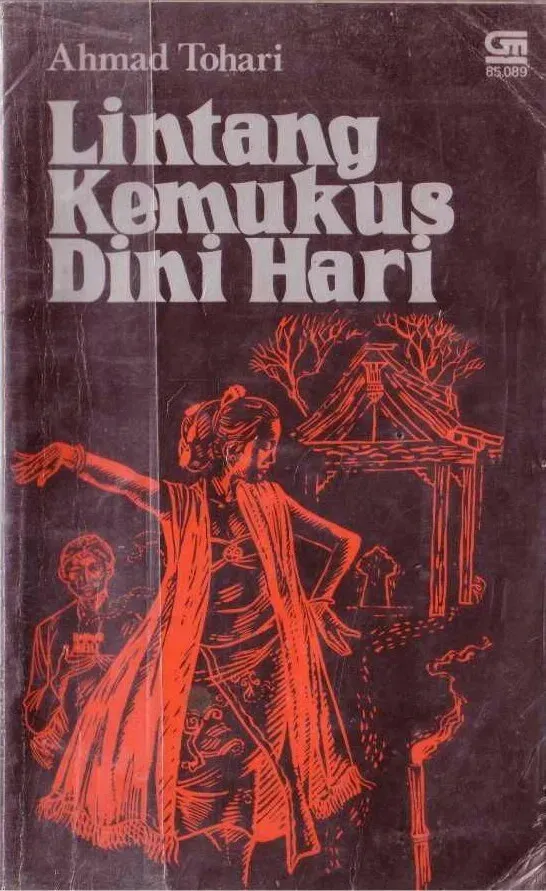Lintang Kemukus Dini Hari

Author: Ahmad Tohari
Category: Fiction, literature
Language: Indonesian
Publication Year: 1985
Pages: 234
Description:
*Lintang Kemukus Dini Hari* by Ahmad Tohari is a novel that takes readers into the heart of rural Indonesia, weaving a narrative that is as rich in culture as it is in its exploration of the human condition. Known for his ability to capture the essence of village life, Tohari gives us a story that feels deeply authentic and immersive, while tackling social issues with nuance and care.
The book centers on Srintil, a young girl who lives in a small village called Dukuh Paruk. Srintil is no ordinary girl—she is chosen to become a *ronggeng*, a traditional Javanese dancer, a role that carries a mix of reverence and moral complexity. Being a *ronggeng* isn't just about dancing; it comes with societal expectations, including sexual services, which makes her both a celebrated figure and a controversial one. From the start, Srintil’s life is complicated by this tension between her role as a cultural icon and her personal desires for a more ordinary existence.
One of the novel’s greatest strengths is the way Tohari presents Srintil as both a product of her environment and a person struggling to define her own identity. On one hand, she’s expected to fulfill the village’s need for tradition and entertainment. On the other, she wrestles with the cost of becoming a *ronggeng*, especially in terms of her autonomy and personal relationships.
The way Tohari paints village life is both affectionate and critical. He doesn’t romanticize poverty or tradition, but he doesn’t dismiss them either. The villagers are bound by customs that give their lives meaning, but at the same time, these traditions can be oppressive, especially for women like Srintil. The novel subtly critiques this without resorting to a heavy-handed approach, leaving readers to reflect on the societal dynamics at play.
In terms of themes, the novel dives deep into issues of fate, free will, and the position of women in a patriarchal society. Srintil’s path is largely determined by her role as a *ronggeng*, a destiny she didn’t choose but one that’s thrust upon her by her community. Yet, throughout the novel, there are moments when she pushes back, questioning her role and seeking a way to reclaim her life. The tension between duty and personal freedom is a recurring theme, and Tohari handles it in a way that feels organic to the story, rather than didactic.
There’s also a powerful undercurrent of spirituality and mysticism in the novel, reflected in the villagers' deep-rooted beliefs and the almost mystical role of the *ronggeng* in their society. The title itself, *Lintang Kemukus Dini Hari*, refers to a rare celestial event, a symbol that can be interpreted in multiple ways, depending on one’s worldview. For some, it’s a sign of fate; for others, it might represent a fleeting moment of change or opportunity. This ambiguity adds a layer of depth to the story, allowing readers to interpret the events in the novel through different lenses.
Tohari’s writing is both lyrical and unpretentious. He has a way of capturing the beauty of simple moments—a sunset over the rice fields, the sound of the *gamelan* in the distance—without making them feel overly sentimental. At the same time, he doesn’t shy away from depicting the harsh realities of village life. There’s poverty, political turmoil, and the ever-present sense that life is fragile, especially for those on the margins of society.
One of the most poignant aspects of the novel is the relationship between Srintil and Rasus, a young man who loves her but struggles to reconcile his feelings with the role she’s been given. Their relationship is marked by both affection and tragedy, as Rasus is torn between his love for Srintil and his inability to accept the life she’s forced to lead. It’s a love story, but not in the traditional sense—there’s no sweeping romance or happy ending here, just two people trying to navigate a world that often feels beyond their control.
As the novel progresses, it becomes clear that Tohari is not just telling Srintil’s story, but also using it as a lens to examine larger societal issues, including the role of tradition in a rapidly changing world, the power dynamics between men and women, and the way individuals are shaped by the communities they come from. These themes feel timeless, even though the novel is deeply rooted in a specific time and place.
Ultimately, *Lintang Kemukus Dini Hari* is a beautifully written, thought-provoking novel that offers both a vivid portrayal of rural Indonesian life and a poignant exploration of individual struggle within a tightly-knit community. Tohari’s ability to balance social critique with empathy for his characters makes this a compelling read, whether you’re interested in Indonesian culture or simply in well-crafted storytelling. It’s a book that leaves you with plenty to reflect on long after you’ve finished reading it.
Personal Notes:
Back to Home